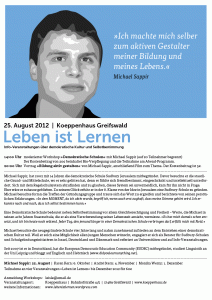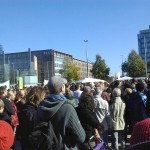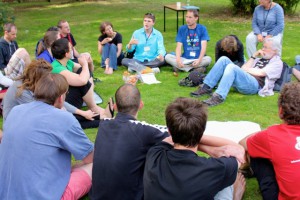So, I’ve been thinking a lot about economics. Now, with tent camp protests across Israel and a 40,000-person march over the price of housing just a few days past, I find myself getting involved in discussions of free market vs. socialism on a very concrete level, and I’m guessing there will only be more of these. I’d like to tell you a little about the different positions I’ve held on these matters, and to try to figure out where I stand now. I haven’t read all that much, I could be much more knowledgeable than I am, and wish I were, but somehow I’ve managed to go through quite a lot of ideologies since middle school.
The first time I recall taking a stance on free market vs. socialism was in the eighth grade, when I made friends with a ninth-grader who was in the Israeli Communist Youth Alliance. I went to their meetings for a while and remember arguing for the ideal of “from each according to their ability, to each according to their need”, which seemed like a very nice idea. Then at some point I had an epiphany that in practice, this would require going against human nature, as it takes away the fruit of people’s labor.
I don’t really know what my point of view was after that happend; these matters probably weren’t very central to me at the time, but I just don’t really remember. I do remember that I started getting a more libertarian perspective as I got involved with democratic education. I suppose I could have been described as a left libertarian, but I thought of myself as a social democrat.
Then, at eighteen, I read a book arguing for libertarianism, and became a libertarian. And a few months later, I read a couple of texts leaning towards anarchism, in particular T. A. Z.: The Temporary Autonomous Zone, and became a sort of anarchist. Very quickly, however, I acknowledged the limited applicability of anarchism in the reality around us today, and became what might be called a realistic anarchist, which is basically someone who is an anarchist at heart but doesn’t do much about it.
That must have been the point where I stopped paying attention to the economic side of things, which is unfortunate because it was also the time when I was probably first able to grasp the way that side of things works. I quickly slid into a kind of apathetic agnosticism about the whole thing, no longer calling myself an anarchist. I always stayed committed to personal freedom when it came to opinion and behavior, but for years now I have been unable to truly pick a side on the free market vs. socialism debate. I do believe that free-market capitalism is a highly effective and “smart” method of allocating resources. But there are two principal problems: that we never start with a flat playing-field, and that money brings along political influence.
It’s worth noting that every single socio-economical or political ideology seems to commit itself to some kind of idealized concept of the citizenry. Libertarianism assumes people are empowered, independent, and generally rational. Capitalism tends to assume the same. Communism assumes the people are committed to the joint effort. I think each of these systems does work well when the assumption is met. It’s just very unusual that it is.
In the case of free-market capitalism, I can imagine it being quite perfect if the playing-field were flat; if everyone were more-or-less equally rich, equally empowered, equally able to make an informed decision, obviously there would be no need for a welfare state. Everyone would be free to do what they want, with money just as with anything else. Nobody would have to be a loser. But this is an imaginary scenario we are never likely to encounter in real life.
When you combine this with the second problem, you have a real problem for libertarianism or free-market capitalism. In every present or past polity I can think of, money has been able to influence politics.
Sticking just to democracies for now, the influence of money on politics seems almost inevitable. Donations are only the most obvious part. The media is a more tricky aspect – those with big money can directly influence public opinion, and there’s no reason to expect this would always be done in an equal and balanced way, under any system. The result is quite simply that my opinion is less influential than that of a multi-millionaire, because my opinion can only reach people I know and people who read my blog, but I cannot easily get it into print media, onto large mainstream websites, or onto physical advertising of any kind. (Yes, I could afford a small print ad, but nothing major that’s likely to reach a whole lot of people, and not in a sustained campaign of any sort.)
So since we start with a tilted playing-field, our free-market economy ensures that the democracy is tilted towards those who start off with more resources. It seems to me that while laws might limit the tilt to a degree, they cannot eliminate it. Money is needed for effective political action, so political interests with moneyed supporters inevitably have an edge on the competition.
That’s more or less where my thoughts are now. I hate the idea of limiting people’s right to do what they want with what they work for and what they own, but I hate even more the idea of politics helping those who need help least urgently. Moreover, any system that creates and maintains social classes full of people who are essentially condemned to be losers is not the kind of system I want to be in. And when we look at Israel, we see a place where there are remarkably many people who are extremely rich, but far more people who are incredibly poor. And public policy does not seem to be able to alleviate their hardship, nor even make a reasonable standard of living and independence accessible for middle-class twenty-somethings.
Like it or not, the government is deeply involved in directing the flow of money in Israeli society, as in most if not all modern democracies. Whether or not this is ideal, it seems clear to me that we should be demanding that the government tilt the economy towards those who need most help, not those who need the least. In recent years, especially under Netanyahu, it seems to be doing its best to allow the rich to get yet richer, while the poor grow poorer and more numerous. (And those who think the income gap is only a problem for the poor, maybe inform yourself about effects it has on crime rates and the spread of epidemics.)
Footnotes

![[Video/Music] Words of freedom, words of hope](https://www.didyoulearnanything.net/wp-content/uploads/012.jpg)
![[Video/Music] Words of freedom, words of hope](http://www.didyoulearnanything.net/wp-content/uploads/012-300x225.jpg)






